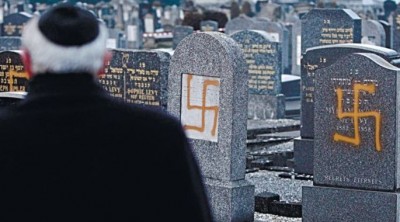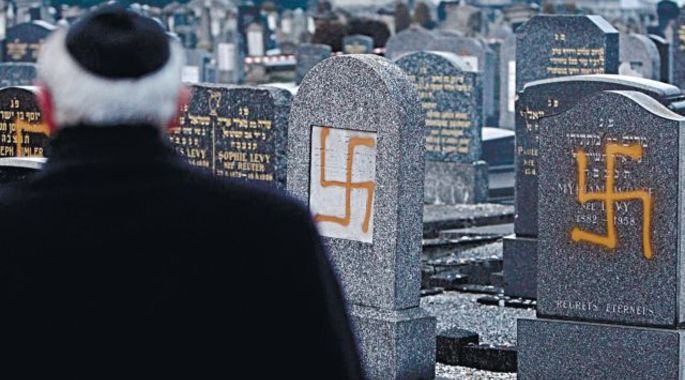
My first experience with anti-Semitism was at 6 years old. Someone painted a swastika on the front gate of my school and I remember asking my dad why it upset him so much. I had a limited understanding of Nazism at that age, but I knew enough to understand when he told me simply that it was a Nazi symbol.
“But why would someone paint a Nazi symbol on our school?”
“Because they hate us.”
I later learned that not long after this experience, my family and I were verbally harassed by a group of neo-Nazis while walking home from synagogue on Shabbat, something my mom spoke about in a way that showed the incident still scared her. I, thank God, have no recollection of this incident—learning that there were people who hated me without even having met me was traumatizing enough—and my forgetfulness reminds me of Jack Halberstam’s discussion on forgetfulness in The Queer Art of Failure, where he says that forgetfulness allows for “life to fill up the spaces that previously were saturated with loss, violation, dehumanization, and memory.” It is those spaces that allow for something more to exist.
As Khalil Gibran writes, “Forgetfulness is a form of freedom.”
Jeffrey Goldberg’s recent article in The Atlantic, “Is it Time for the Jews to Leave Europe?,” made some astute points on the rise of anti-Semitism in Europe, but one that I want to repeat before delving into anti-Semitism in France concerns Muslim violence against Jews.
That the chief propagators of contemporary European anti-Semitism may be found in the Continent’s large and disenfranchised Muslim immigrant communities—communities that are themselves harassed and assaulted by hooligans associated with Europe’s surging right—is flummoxing to, among others, Europe’s elites. Muslims in Europe are in many ways a powerless minority. The failure of Europe to integrate Muslim immigrants has contributed to their exploitation by anti-Semitic propagandists and by recruiters for such radical projects as the Islamic State, or ISIS.
This understanding, that much of Muslim European anti-Semitism is the result of pre-existing European anti-Semitism that Muslims have taken advantage of as a way to integrate, is much more compelling to me than any blatantly racist claim that the rise of anti-Semitism in Europe is the result of Muslim immigrants. We need to acknowledge that anti-Semitism has existed in Europe for a very long time.
It is this anti-Semitism, and this France, that I am interested in grappling with – the France that I claim a part of and that rejects me at the same time. The very European, very anti-Semitic France.
I don’t remember a time when other Jews, upon learning that I am French, did not immediately ask how things were “over there.” But with more news of anti-Semitic violence in Europe, the questions have become much more dire. “Is your family safe?” “Do you ever think you’ll go back?” “Do you think Jews should leave France?” In some ways, it’s touching that people care and worry about my anxieties and my family’s safety, but the comments that are not directed toward me are much more uncomfortable to hear. It’s often that I hear Jews say that Europe has become unsafe or that Jews should definitely leave France. Often a simple “fuck France” says it all.
And while I understand their concerns and their anger over the violence, it fills me with a sense of dread over whether I can ever safely live in France again, over whether I can still fully connect to being French, over whether a ‘French Jew’ can even exist.
What does it mean to be a French Jew?
I am not new to the phenomenon of French anti-Semitism, it has always seemed to be an inconvenient fact, but one that rarely got in the way. It was the insistence from my grandmother that my brother take of his kippah on certain occasions, or the interactions with aggressive graffiti, but nothing to be too concerned about. There was however, one interaction with such graffiti that sticks out in my mind – something spray painted on a bridge that I saw while driving through Paris with my aunt. We descended into an unsteady silence when we saw it, neither of us acknowledging or explaining its presence. I think to a certain extent, we both pretended my French was simply not strong enough to understand the words, and while there have been points where communicating with my family was a difficult project of combined broken English and broken French, even with a limited grasp of the language, there are not many ways to misunderstand the phrase “mort aux Juifs” – “death to Jews.” But pretending it wasn’t there or that I didn’t understand was easier than acknowledging its presence and all the questions the words came with. Forgetfulness is a form of freedom.
There are many more examples of violent and aggressive acts of anti-Semitism, whether physical or verbal, but those incidents always bring me back to the same question: What does it mean to be a French Jew?
There is certain way that other French people look at me when they learn that I’m Jewish. I can’t say quite what happens, but I can see it in their eyes. A change in the way they see me. It’s the way they say, “Oh, you’re Jewish?” Like Jewish means not-French. Or French with an asterisk. French, but not really French.
Maybe I’m just paranoid, but it’s clear in the way both non-Jews and Jews talk about French Jews. Whether it’s the chants “Juif, la France n’est pas à toi”—“Jew, France is not for you.” or Bibi’s insistence that “Israel is your home,” it always come down to the same thing. Sure, French Jews are French, but they’re not really French.
I worry and I wonder if there is some truth to this. Perhaps the only reason Jews could even be considered French is due to their being sufficiently colonized into the European framework where Judaism can be set aside as simply a part of person, as simply just a different form of Christianity. Perhaps my desire to be considered fully French as well as fully a Jew is my internalization of those ideas.
I spent a year living in France after graduating from high school, where I spent time taking classes in a local Catholic school. It was rare that my Jewishness came up while I was there, as I had been on a break from observance at the time. In so many ways, I wanted nothing to do with the Judaism that caused me so much strife while growing up, but in other ways, I just didn’t know how to talk about what it felt like to be a Jew in a world surrounded by non-Jews. One conversation I had with a Muslim woman who lived in the same town stands out to me, when we discussed our mutual disgust for pork. Neither of us were particularly religious at the time, but we talked about how not eating pork had nothing to do with religious obligation. It was simply a fact of life.
There was something about that conversation that felt like a lifeboat in so many ways. While we spent our daily lives pretending we were just the same as all the French people surrounding us, that came at a cost of erasing our differences. “You don’t eat pork either, do you?” she said, like she was saying “I see you, do you see me?” It was a momentary acknowledgement that in all the ways we were French, there were so many ways we were not French. It was a relief, but one that lasted for no longer than the length of our conversation. It’s easier not to acknowledge those questions. Forgetfulness is a form of freedom.
In an essay titled “Eating the Bread of Affliction: Judaism and Feminist Criticism,” Susan Grubar says, “By an accident of birth, I was a Jewish feminist, but by virtue of that very fact I could not conceive of myself becoming a feminist Jew, a label that would have struck me as a contradiction in terms.” She goes on to describe the ways that Judaism and feminism mutually contradict each other, and in her view can neither exist together or apart. “When the hidden piece of matzah is found by the child, should the broken afikomen fit like a jigsaw puzzle piece into the other half of matzah on the Seder plate, could we almost taste a spring in which kindness endures forever? Or is the concealed afikomen called tzafoon (that which is hidden) because such a consummation always eludes us?”
It is a similar tension that I feel in the relationship between my Frenchness and my Jewishness. While I have always and will always describe myself as a Jew first and foremost, any other identifier is simply an adjective to the noun, how can it be that French feels at home in my mouth in a way that Hebrew never will?
One of my cousins’ favorite singers, Camille, has a song titled “La France” where she describes Japan as excelling in manufacturing cars, and the United States as great at R&B, and she climaxes with “La France, la France, des photocopies!” The song is sung in the sort of style of Edith Piaf – old nasal way of singing French, with grand rolling “r”s.
I’ve always understood the song to be a wry commentary on French exceptionalism, with her list of the ways other countries excel and her descriptions of the unique functions of the sky or the sun, she punctuates her song with an insistence that “La France” excels in photocopying. This seems to me to be a mention of the long and violent history of French colonialism that resulted in France being great at nothing but taking from others. The myth of French creativity and genius is just that, a myth, and France is rather built up on a history of “photocopying” what is already great.
She takes the old French style of singing and commits to it fully while also ridiculing it in the same breath. And that’s why I love this song – it feels very old and very prideful and reminds me of my grandparents, but at the same time is highly critical of the basis of French pride. And it feels very real. That I can in the same breath claim my Frenchness and criticize the way my Frenchness denigrates my Jewishness. It’s an exercise in dealing with conflicting truths, a way to heal from that pain.
Camille ends the song accompanied by children, and at the final note her voice cracks, revealing both her desire to achieve that grand old Frenchness while also revealing its falsity. Such a project, of comfortably existing within that “both-and” space, rather than an “either-or,” is a project for children. One that requires full commitment and a sense of naivete as well as a willingness to forget. I don’t have the answer to the question “What does it mean to be a French Jew?” but I am also not particularly interested in finding one. Such an answer seems fated to be too painful to bear, and so I would rather exist perpetually within that question. Allow myself to be washed over with overblown commitment and naivete and a willingness to forget. That tension filled space seems as good of a space to inhabit as any. Forgetfulness is a form of freedom.
Ari Bloom is a student at The New School.

